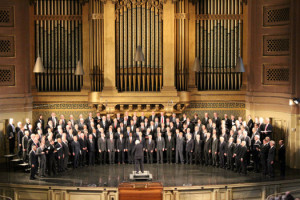
Yale Russian Chorus – credit Andrei Bekrenev
YALE RUSSIAN CHORUS
60 Years of Vocal Tradition
Let others talk about Lorde, Miley Cyrus’ latest video and the new Beyonce promotion, er, album. Me? I’m still basking in the glow of seeing a bunch of 70-something American men singing Tsarist and Red Army songs along with Russian liturgical and folk music fare at Yale a few weeks ago.
Okay, so they weren’t all in their 70s. But it was in fact the 60th anniversary celebration of the Yale Russian Chorus Alumni at the campus’ Woolsey Hall, where a Buddhist monk, a former U.S. Solicitor General, a former American Ambassador, the president of Tuskegee University, and a bush pilot were among the 140 highly disparate “Old Blues” in the YRC alumni crowd who filed out to increasing applause from family members, friends and fans of the lusty “rip open your shirt” male vocal tradition passed down at Yale since the most frigid days of the Cold War.
Indeed, then Yale Chaplain (and future famed peace activist) William Sloane Coffin claimed that the YRC, which was founded in 1953, helped tear down the Iron Curtain. The Wall Street Journal hailed the singers as “Diplomats of Song,” while Senator Hubert Humphrey said that the U.S. should have had 100 choruses like it.
Incredibly, relatively few of the chorus members actually speak Russian, yet have learned to sing it so well via Russian-English language transcription that the young Russian correspondents of the ITAR-TASS Russian news service’s New York bureau who joined me were dumbstruck.
The chorus originated when faculty advisor and Yale Russian Club president George Litton asked Yale Music School student Denis Mickiewicz, who was born into a Russian family in Latvia and was musically gifted, to teach the group a few traditional Russian folk songs. Mickiewicz brought guitar, mimeographed arrangements, and a bottle of vodka under each arm, and managed to transcend the vocal limitations of the club through his passion for the Russian choral repertoire.
In its 60 years, the YRC completed 16 tours of the U.S.S.R. and Eastern Europe. When they first performed in Moscow in 1958, they transformed the preconceptions of America held by propagandized Muscovites.
At home, however, they had to deal with racism: When an African-American member was refused service during an early American tour, all instantly arose and left the restaurant. During the McCarthy era, the chorus was detained in Ohio while state police checked to make sure it was not a subversive organization.
As indicated, though, chorus members would later become prominent representatives of government and leaders in human rights movements, and the chorus would go on to win international choral competitions, release 18 recordings and perform in the world’s leading concert halls. It is now the oldest continuously performing Russian singing group in America.
Incredibly, Mickiewicz, now a professor emeritus at Duke University, has remained the musical and spiritual leader of the group, having guided the conductors who succeeded him after leaving Yale to pursue his academic career. And there he was conducting the 60th anniversary gala.
I’d seen smaller YRC Alumni groupings twice previously in New York, both in 2011. Fifty or so members showed up for a sold out concert at 92nd Street Y as part of its Russian Sundays! program of Russian and Russian-Jewish culture events.
My friend Vladimir Kikilo, then the New York ITAR-TASS bureau chief, was moved almost beyond words.
“It’s amazing for me that Americans can be so deeply in love with Russian music,” he said, calling the concert a “lifetime experience.” He added, “It makes me feel proud for my country and my culture.”
Observed Litton: “It’s an odd bunch of guys, because Yale wasn’t receptive to anything Russian. But it’s a brotherhood stronger than any friendship, created by the soul of Russian music. Here are men who are still together after almost 60 years—because of the music. There were people in the audience with tears in their eyes.”
Among them was Vladimir.
“It returned me to my roots,” he said. “They loved the music so much I felt the emotion. It reminded me who I am.”
Vladimir later in the year enlisted a smaller, New York-based contingent of YRC Alumni to help celebrate the Russian Samovar’s 25th anniversary with an a cappella performance at the Midtown Manhattan restaurant, known for its 16 flavored in-house varieties of vodka.
In attendance were Russian luminaries including Mikhail Baryshnikov and conductor/pianist Maxim Shostakovich (son of Dmitri Shostakovich) and American counterparts like Russian studies scholar Stephen F. Cohen and his wife Katrina vanden Heuvel, editor of the The Nation. Among the songs performed was “Soldatushki” (“Soldier Boys”), an old Russian army song “from the tsar time,” Vladimir explained.
“The lyrics ask, ‘Who are your brothers?’ and answers, ‘the gun powder’ for the cannon. ‘Who are your sisters?’ ‘The bayonets.’ ‘Who are your grandfathers?’ ‘Our famous victories.’ And so on,” Vladimir translated.
At Yale, the alumni encored with “Soldatushki.” Afterwards at a VIP reception, the guys burst into the traditional “Mnogaya Leta!” (“Many years!”) toast, then broke into smaller factions to continue singing, vodka cups in hand.
Somewhere in the world, they still are.
Jim Bessman



comment closed